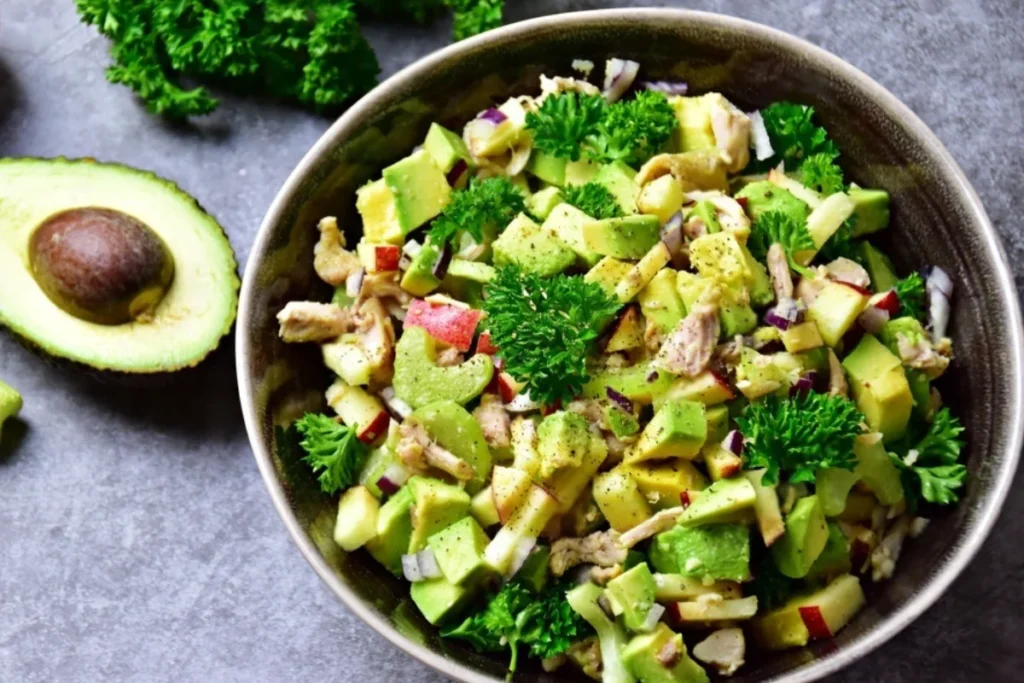The ketogenic diet, often referred to as keto, has gained immense popularity for its potential in weight management and health improvement. Central to this diet is the concept of ketosis, a metabolic state where the body burns fat for energy instead of carbohydrates.
Key aspects of the introduction include:
- An overview of the keto diet, highlighting its low-carb, high-fat approach.
- The role of ketosis in promoting fat burning.
- Introduction to avocados as a beneficial food in the keto diet.
This introduction sets the stage for a deeper exploration of how incorporating avocados can enhance the effectiveness of the keto diet. With a focus on nutritional balance and healthy eating, the article aims to provide valuable insights for those navigating the keto lifestyle.
The Keto Diet Explained
The Keto Diet is a unique dietary approach that has revolutionized the concept of effective weight loss and health optimization. It primarily focuses on a high-fat, moderate-protein, and low-carbohydrate intake, fundamentally altering the way the body processes energy.
Key points about the Keto Diet:
- It drastically reduces carbohydrate intake and replaces it with fat.
- This shift pushes the body into a metabolic state called ketosis.
- In ketosis, the body becomes incredibly efficient at burning fat for energy.
During ketosis, the liver converts fat into ketones, which serve as an alternative energy source for the brain. This process is essential for the diet’s effectiveness. The reduction in carbs also leads to a significant decrease in blood sugar and insulin levels, which has additional health benefits.
The Keto Diet is not just about weight loss; it’s also linked to numerous health benefits. These include improved heart health, brain function, and potentially lower risks for certain chronic diseases. However, it’s crucial to approach this diet with a balanced perspective, ensuring nutritional adequacy and sustainability.
In summary, the Keto Diet offers a distinctive approach to eating, emphasizing the importance of fats and ketones over carbohydrates. It’s a diet that requires careful planning and consideration to ensure it’s both effective and healthy.
Avocados on Keto Diet
Avocados are a staple in the Keto Diet, revered for their unique nutritional profile that aligns perfectly with the diet’s requirements. This fruit is a powerhouse of healthy fats, essential nutrients, and minimal carbohydrates, making it an ideal choice for anyone following a ketogenic lifestyle.
Key Attributes of Avocados in a Keto Diet:
- High in Healthy Fats: Avocados are rich in monounsaturated fats, which are heart-healthy and help maintain good cholesterol levels. These fats are crucial in the keto diet, as they provide the majority of daily caloric intake.
- Low in Net Carbs: The carbohydrate content in avocados is low, and most of it is fiber. This makes the net carb content minimal, which is essential for staying in ketosis.
- Rich in Fiber: Despite being low in carbs, avocados are high in fiber, aiding in digestion and helping to prevent constipation, a common issue in keto diets.
- Nutrient-Dense: They are packed with essential vitamins and minerals, including potassium, which helps in balancing electrolytes, and vitamins C, E, and K.
Incorporating avocados into a keto diet offers several benefits:
- Satiety and Weight Management: The high fat and fiber content in avocados promote a feeling of fullness, reducing the urge for frequent snacking.
- Versatility in Recipes: Avocados can be used in a variety of keto-friendly recipes, from salads and smoothies to baked goods and sauces. For example, try incorporating avocados into this Easy Chicken Salad for a keto-friendly twist.
- Health Benefits: Regular consumption of avocados on a keto diet can improve heart health, skin health, and overall well-being.
In conclusion, avocados are not just compatible with the keto diet; they enhance it. Their nutritional profile supports the diet’s goals and offers health benefits that extend beyond weight loss and management. Whether eaten alone or as part of a meal, avocados are a keto-friendly food that can enrich the diet both nutritionally and gastronomically.
Avocado Consumption: How Much is Too Much?
While avocados are a keto-friendly superfood, it’s important to understand the right balance in consumption. Moderation is key, even with healthy foods, to ensure a well-rounded diet and avoid potential drawbacks.
Determining the Right Amount:
- Daily Limit: Generally, one whole medium-sized avocado per day is considered safe and beneficial for most individuals on a keto diet. This amount provides the necessary fats and nutrients without overloading on calories.
- Individual Needs: The ideal intake can vary based on personal health goals, caloric needs, and how avocados fit into the overall daily macronutrient distribution. It’s essential to consider the total daily intake of fats and calories.
- Nutritional Balance: While avocados are nutritious, relying too heavily on them can lead to a lack of variety in your diet. It’s important to consume a diverse range of foods to ensure you’re getting all necessary nutrients.
Potential Concerns with Overconsumption:
- Caloric Surplus: Despite being healthy, avocados are high in calories. Eating too many can lead to a caloric surplus, which might hinder weight loss goals.
- Nutrient Excess: Excessive consumption can lead to an imbalance in nutrient intake, particularly in terms of fat and calorie ratios.
In summary, while avocados are an excellent addition to a keto diet, they should be consumed in moderation. Balancing avocado intake with other nutrient-rich foods is crucial for maintaining overall health and achieving dietary goals. As with any dietary change, it’s advisable to consult with a healthcare provider or nutritionist to determine the best approach for your individual needs.
Incorporating Avocados into Your Keto Diet
Incorporating avocados into your keto diet is not only beneficial for health but also adds variety and flavor to your meals. Here are some creative and delicious ways to include avocados in your keto-friendly diet:
- As a Breakfast Staple: Start your day with avocados by adding them to scrambled eggs or making an avocado and spinach omelet. Their creamy texture complements eggs perfectly, providing a nutritious and filling breakfast.
- In Salads: Avocados can be a hearty addition to any salad. Dice them into a chicken or tuna salad for a dose of healthy fats, or simply mix them with leafy greens, olive oil, and vinegar for a quick keto salad.
- As a Snack: For a simple yet satisfying snack, enjoy half an avocado seasoned with salt, pepper, and a squeeze of lemon. You can also stuff it with tuna or chicken salad for a more substantial snack.
- In Smoothies: Add a creamy texture to your keto smoothies by including avocado. It pairs well with ingredients like coconut milk, spinach, and low-carb berries, creating a nutrient-packed drink.
- As a Substitute for High-Carb Ingredients: Use mashed avocado as a substitute for mayonnaise in recipes, or create an avocado-based sauce for zoodles (zucchini noodles).
- In Desserts: Avocado can be used in keto-friendly dessert recipes, such as chocolate avocado mousse or avocado ice cream, offering a rich, creamy base without the added sugars.
Incorporating avocados into your keto diet is easy and beneficial. Their versatility in both savory and sweet dishes makes them an ideal ingredient for maintaining a balanced and enjoyable keto diet.
Potential Risks and Considerations
While avocados are highly beneficial in a keto diet, there are potential risks and considerations to be aware of:
- Caloric Density: Avocados are calorie-rich. Overconsumption can lead to excess calorie intake, potentially hindering weight loss efforts or leading to weight gain.
- Allergic Reactions: Some individuals may have an allergy to avocados, experiencing symptoms like itching, swelling, or gastrointestinal discomfort.
- Medication Interactions: Avocados contain high levels of vitamin K, which can interfere with blood-thinning medications like warfarin. It’s important to monitor intake if you’re on such medications.
- Nutrient Imbalance: Relying too heavily on avocados can lead to an imbalance in your diet. It’s crucial to maintain a varied diet to ensure you’re getting a range of nutrients.
- Gastrointestinal Issues: For some, high intake of avocados can cause gastrointestinal discomfort due to their high fiber content.
In conclusion, while avocados offer numerous benefits in a keto diet, it’s important to consume them in moderation, be mindful of individual allergies or medication interactions, and maintain a balanced diet for optimal health.
FAQs on Avocado Consumption in a Keto Diet
- Can eating too many avocados kick you out of ketosis?
- Eating too many avocados can potentially exceed your daily carb limit, risking your state of ketosis. While they are low in net carbs, moderation is key.
- Are there any side effects of eating avocados daily on keto?
- Generally, eating avocados daily is safe and beneficial on keto. However, overconsumption can lead to excess calorie intake and potential gastrointestinal discomfort due to high fiber.
- How do avocados compare to other keto-friendly fruits?
- Avocados are unique for their high healthy fat and low net carb content, making them more keto-friendly than many fruits which tend to have higher sugar and carb content.
- Can I eat avocado if I have a nut allergy?
- Avocados are not nuts, but some people with latex allergies may have a cross-reaction. If you have a nut allergy, avocados are generally safe, but consult with an allergist if you have concerns.
- Is avocado good for weight loss on keto?
- Yes, avocados can aid in weight loss on keto due to their high fiber and fat content, which can increase satiety and reduce overall calorie intake.
- How does avocado consumption affect cholesterol levels?
- Avocados are high in monounsaturated fats, which can help lower bad cholesterol (LDL) and potentially raise good cholesterol (HDL), benefiting overall heart health.
- Can I replace meals with avocados on a keto diet?
- While avocados are nutritious, they should not replace whole meals. A balanced diet including protein, vegetables, and other fats is important for nutritional completeness.
- Are avocados suitable for all types of keto diets?
- Yes, avocados fit well into various forms of keto diets, including standard, cyclical, and targeted keto, due to their low carb and high fat content.
- How can I tell if an avocado is ripe for eating?
- A ripe avocado will feel slightly soft when gently pressed and the skin may turn darker. The stem cap should come off easily, revealing green underneath.
- Can avocados cause keto flu?
- Avocados are unlikely to cause keto flu. In fact, their high electrolyte content (potassium) can help alleviate keto flu symptoms.
Conclusion
In conclusion, avocados play a significant role in enhancing the keto diet, offering a perfect blend of healthy fats, low net carbs, and essential nutrients. Their versatility in culinary uses further adds to their appeal in a keto-friendly lifestyle.
- Avocados are not just a food item; they are a nutritional powerhouse in the keto diet.
- Their unique composition supports ketosis, aids in weight management, and contributes to overall health and wellness.
However, it’s important to consume avocados in moderation to maintain a balanced diet and avoid potential risks such as caloric overconsumption or nutrient imbalance.
- Incorporating a variety of foods alongside avocados ensures a well-rounded keto diet.
- Understanding the role of dietary fiber in keto is also crucial for digestive health.
Avocados are a keto dieter’s ally, offering numerous health benefits and culinary versatility. By integrating them wisely into your diet, you can enjoy the full spectrum of their nutritional value while adhering to the principles of the keto diet.


